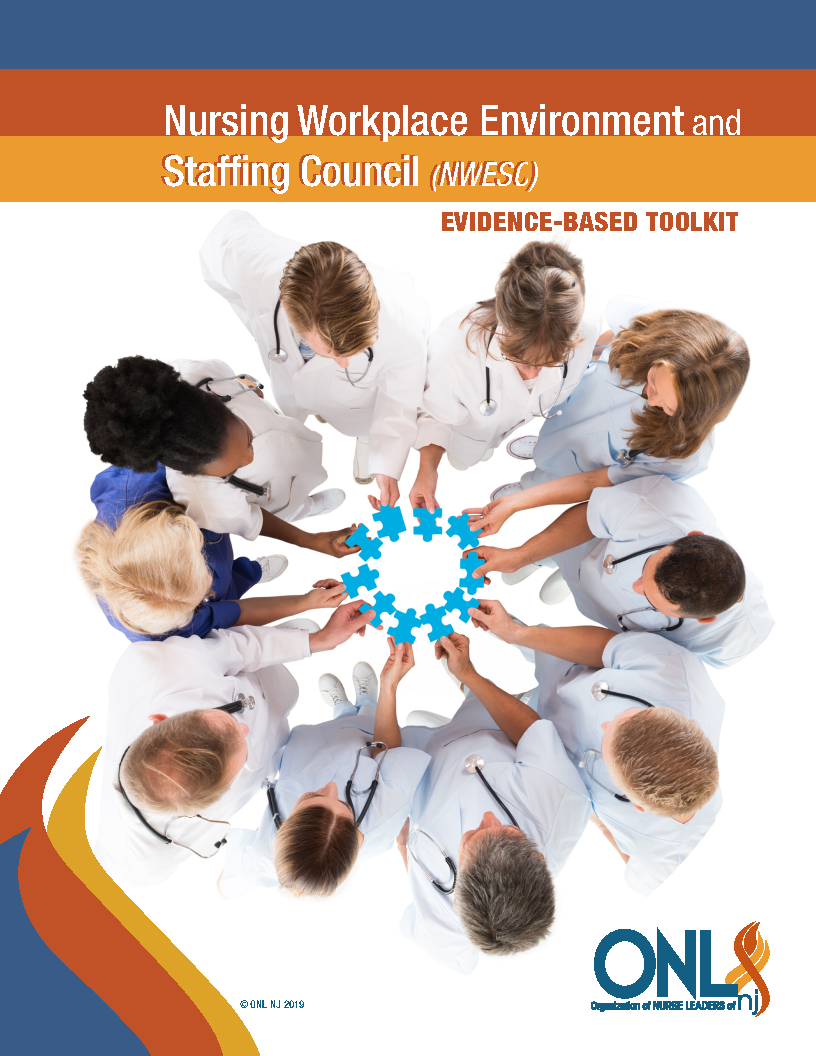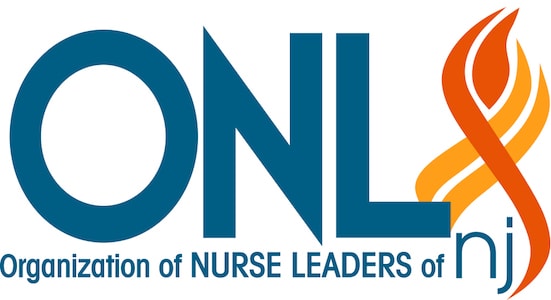Nursing Workplace Environment and Staffing Council Program
In the quest to improve patient care, staff satisfaction and avoid unnecessary regulations, nurse leaders are positioned to play an important role to guide policy makers. A key strategy to engage staff can be implementing healthy work environment councils that are empowered to make recommendations and decisions to drive policy at the organizational level and potentially across the healthcare continuum. The Nursing Workplace Environment and Staffing Council Program (NWESC) was born out of the work by the NWESC Steering Committee, an arm of the ONL NJ Advocacy Committee.
Work Environment Summary
There has been considerable discussion since California became the first state in 2005 to authorize a law (AB 394) mandating a fixed nurse-to-patient ratio in hospitals. There is no research to support better outcomes in states with legislated staffing ratio, e.g. California (Serratt, 2013). Since that time, research teams have extensively evaluated the patient outcomes in California to determine if the nurse to patient ratio legislation has improved quality. These outcomes studied include pressure ulcers, falls, restraint use, mortality, urinary tract infections, patient length of stay and wait time. Currently, the evidence strongly suggests that patient outcomes have moderately improved post-legislation (Bolton, et al 2007; Cook, et al 2012; Hickey, 2011; Serratt, 2012; and Serratt, 2013).
Positive nurse work environments have been linked to better patient outcomes. With better work environments, the odds of patient mortality decreased by factors of 0.92 and 0.96 (or by 8% and 4% respectively) (Aiken, et al 2011). Therefore, consideration of work environment, in addition to nurse staffing, needs to be addressed when hospital administrators make staffing decisions.
Innovative Program
In July of 2016, the Organization of Nurse Leaders of New Jersey (ONL NJ) decided to take proactive steps to develop a model focused on creating and maintaining a healthy work environment. The ONL NJ Nursing Workplace Environment (NWESC) Commission was established. The goals of the Commission were to review the literature related to the impact of the California law, the impact of the proposed Massachusetts law, initiatives in other states and the relationship of staffing ratios to nursing satisfaction and patient outcomes.
The steering Commission's vision statement is: New Jersey will be recognized as the leader in creating and sustaining a healthy work environment for its nurses; and its mission statement is: to promote and sustain a healthy workplace environment for the nurses of New Jersey.
Under the leadership of ONL NJ, a coalition of key nursing organizations was established in support of the model. The coalition members include New Jersey State Nurses Association, the New Jersey Council of Magnet Organizations, New Jersey Hospital Association, the New Jersey Council of Deans and Directors, the New Jersey Nursing Leadership Council and ONL NJ. In November 2016, the Chief Nursing Officers Constituency Group of the New Jersey Hospital Association endorsed the program.
The purpose of the NWESC program is to:
- Give respected voice to staff nurses in the establishment of healthy nursing work environments,
- Create a forum of participated leadership,
- Give direct care nurses a voice in human resource allocation through a formal process, and
- Support equal participation of staff nurses in collaboration with management.
The structure of every NWESC council is:
- 51 percent bedside nurses with at least 50 percent of their work time spent in direct patient care,
- Chief Nursing Officer (CNO) chairs the council with a direct care nurse,
- Council participates in developing a plan for nurse staffing and creating a positive work environment and forwards the plan to the CNO for budget planning, and
- The number of staff nurses on the council is sufficient to provide adequate representation of all nursing care in the hospital.
Conceptual Framework
The NWESC program is based on the American Association of Critical Care Nurses’ (AACN) “Standards for Establishing and Sustaining Healthy Work Environments” conceptual framework. The pillars include the following elements:
- Skilled communication – nurses must be as proficient in communication skills as they are in clinical skills
- True collaboration – nurses must be relentless in pursuing and fostering true collaboration
- Effective decision making – nurses must be valued and committed partners in making policy, directing and evaluating clinical care and leading organizational operations
- Appropriate staffing – staffing must ensure the effective match between patient needs and nurse competencies
- Meaningful recognition – nurses must be recognized and must recognize others for the value each brings to the work of the organization
- Authentic leadership – nurse leaders must fully embrace the imperative of a healthy work environment, authentically live it and engage others in its achievement.
NWESC Education
All NWESC members are required to complete three education seminars as part of the structured curriculum. The syllabus for each of the education sessions is the following:
– Session #1 – Overview NWESC Program, Legislation on Mandated Staffing, Research on Healthy Work Environment (HWE), HWE Framework Model, NWESC Structure, NWESC Leaders Panel Discussion
– Session #2 – Co-chair Reports, Skilled Communication and Effective Listening, True Collaboration, Authentic Leadership
– Session #3 – Co-chair Reports, Appropriate Staffing and Budgeting, Effective Decision Making, Meaningful Recognition
Each NWESC member is given a binder with the education module slides for reference and use at their council meetings in their hospital. The NWESC Evidence-Based Toolkit is also provided to all NWESC members to be a resource guide for the implementation of their councils in the hospitals.

Contact, Taniesha Knight, Program Coordinator, tknight@onlnj.org
